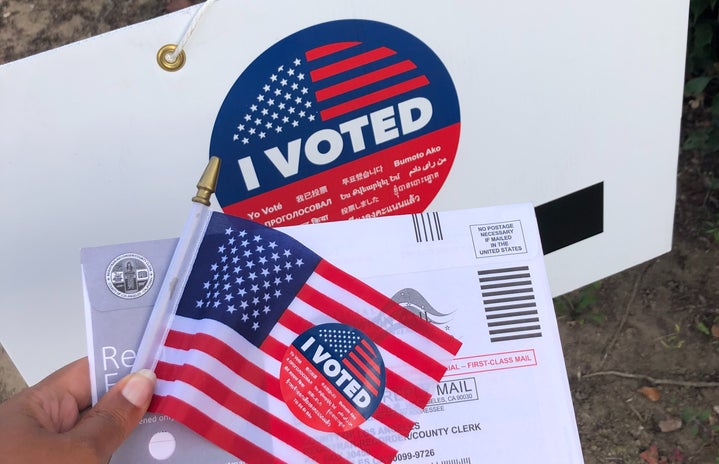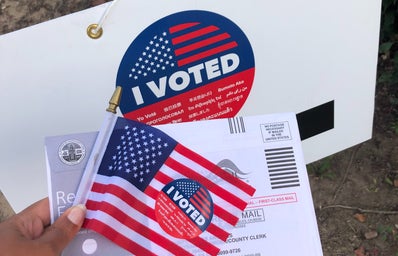My friend leaned toward me as if preparing to share her darkest secret. “Can I tell you something I’ve been struggling with?” she asked me. “Of course,” I replied, anticipating a conversation about academic struggles or relationship troubles. Instead, my friend grimaced and whispered, “I am so not interested in politics.”
As college students, we are not only pursuing degrees and learning how to “adult”; we are also forming our own relationships with politics. Right now, unless you’ve found a nice, cozy rock to call home, it’s pretty hard to avoid the news. And with the upcoming election, attacks on reproductive rights, the LGBTQ+ community, people of color, environmental catastrophe, the COVID pandemic and its economic consequences, and the horrific mass shootings that have somehow become commonplace in this country, it’s also tough to separate politics from our own lives. That being said, not everyone is hoarding megaphones and lugging homemade signs to the White House. And, for my friend, that has proved problematic.
“I feel guilty – and other people make me feel guilty – for not wanting to be involved,” she admitted. “But I hate listening to the news, and our government is so messed up that I don’t feel like I can even make a real difference.”
My friend’s words lingered in my mind long after our discussion. Like her, I believe that many young adults are disillusioned with a governmental system that is polarized and, often, ineffective. Like her, I believe that many young adults suffer from worsened mental health as a result of the overwhelmingly negative news cycle. And, like her, I believe that many young adults are shamed – often by other young adults who are politically engaged – for their lack of participation.
So…should my friend and others like her feel guilty for their disinterest and disengagement? In my opinion, the answer, like nearly everything related to politics, is nuanced.
My personal belief is that it is irresponsible – and, as previously mentioned, nearly impossible – to be completely disengaged from politics. Given our government’s profound impact on human rights, the economy, and environmental policy, living within a privileged bubble of inaction while others are suffering is just plain wrong. Not to mention, previous generations fought tirelessly for our right to participate in the political process – we can’t squander it now. Finally, I strongly disagree with my friend’s statement that individuals can’t make a difference in our political system. We all have a voice, and if everyone decides not to use theirs, nothing will ever change.
At the same time, I don’t think people should be chastised for disinterest in deep political involvement. Not everyone is comfortable with protesting, public speaking, or running for office…and I think that’s okay. While I agree that discomfort isn’t a reason to back down from a crucial fight, I think that there are ways to participate politically that are just as meaningful, but more doable for those averse to intensive avenues. And I certainly don’t think that shaming people is a productive way to get them more involved.
I also think that there is validity in claiming that the news media is toxic. Listening to or watching the news for hours on end – regardless of what channel you watch – can cause extreme stress and agitation. Does this mean that we should bury our heads in the sand and ignore current events? Absolutely not. But does it mean that we should jeopardize our mental health by forcing ourselves to constantly be tuned in? I don’t think so. Again, I believe that there is a “middle way,” option that holds us accountable while honoring our personal limits.
Luckily, there are myriad ways to engage with the news and participate in politics. If watching or listening to the news isn’t your cup of tea, try reading a newspaper or scrolling through articles on your phone. Often, reading about current events is less stressful than tuning into a television program or listening to the radio. As well, think critically about the media outlet you’re getting your news from. Whether you identify as liberal or conservative, following ideologically-influenced sources can not only spread biased or even fake news but can be damaging to your mental health (there tends to be more contentious, anxiety-provoking messaging on these channels). Try following a non-partisan outlet instead, or explore podcasts that cover social justice and news-related topics in a more conversational, less alarmist way.
Not interested in attending rallies or organizing walk-outs? Instead, write letters to your state representatives; phone-bank for a preferred candidate; write letters to encourage people to vote; research and join political volunteer organizations; donate to political campaigns or charitable organizations that address issues you’re passionate about; write and publish articles that raise awareness about current events; educate yourself by reading books, taking classes, listening to podcasts, and watching documentaries about social justice issues; be open to political conversations with others and really listen to their points of view; if someone is spreading hate or misinformation, politely but firmly shut them down; and, most importantly, get out to the polls and vote!
No matter how you choose to get involved, take pride in your contributions to our political system, and know that you can make a difference!


